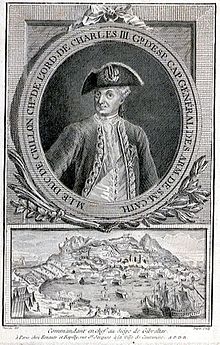Louis des Balbes de Berton de Crillon, duc de Mahon
| Louis des Balbes de Berton de Crillon, duc de Crillon, duc de Mahon | |
|---|---|
 |
|
| Born |
27 February 1717 Avignon |
| Died | June 1796 (aged 80) Madrid |
| Nationality | French |
| Occupation | Soldier |
| Known for | Invasion of Minorca, Great Siege of Gibraltar |
| Title | Duc de Crillon, duc de Mahon, Knight of the Golden Fleece, Captain-General of Valencia and Murcia |
| Spouse(s) | (1) Françoise-Marie-Elizabeth Couvay (2) Florence-Radagonde-Louise-Eléonore-Julie Bruneau de la Rabatelière (3) Josephe-Anathase-Roman-Garmon Spinosa de Los-Monteras |
| Children | Louis-Alexandre-Nolasque-Félix de Balbe Berton, François-Félix Dorothée, Louis-Antoine-François de Paule, Marie-Thérèse-Virginie-Françoise de Paul |
| Parent(s) | François Félix de Berton des Balbes, Marie-Thérèse de Fabry de Moncault |
| Relatives | Louis-Athanase des Balbes de Berton de Crillon |
Louis des Balbes de Berton de Crillon (22 February 1717 – June 1796) was the 4th Duke of Crillon and 1st Duke of Mahon. He became a soldier at the age of 16 and served with distinction in the French army before transferring to the army of Spain, which was allied with France for much of the 18th century. By the end of his life he had risen to the highest military rank in Spain and it was said that he had served in 68 engagements. His most famous achievement was the successful invasion of Minorca in 1781, in which he defeated a British garrison and returned the island to Spain, although his efforts the following year to recapture Gibraltar from the British were a notable failure.
Born in Avignon on 22 February 1717, Crillon was a member of a distinguished family that had originated in Chieri, Piedmont. His branch of the family had a long history of military service to the French crown. A descendant of the famous 16th-century general Louis des Balbes de Berton de Crillon ("the brave Crillon"), he was the son of the 3rd Duke of Crillon, François Félix de Berton des Balbes, and Marie-Thérèse de Fabry de Moncault. Louis was the first-born of the couple's six children (four boys and two girls).
Crillon joined the Régiment du Roi (King's Regiment) in 1734, aged 16, as a lieutenant en second and participated in France's Italian campaign during the War of the Polish Succession. He was soon promoted to lieutenant en premier and took part in a number of notable actions, including the Battle of San Pietro, under the command of the Marshal de Villars. He remained with the regiment until 1738 when he was promoted to the rank of colonel in the Régiment de Bretagne (Regiment of Brittany).
In 1742, he served with distinction in Bavaria under the command of the duc d'Harcourt during the War of the Austrian Succession. Crillon won particular renown for his tenacious defence of Landau an der Isar against a 10,000–strong attacking force led by the Grand Duke of Tuscany. When he was asked to surrender, Crillon told the enemy general that he could not as he had a name and a personal reputation to defend. The general is said to have replied, "Sir, we know and believe [this] since the beginning of the campaign; but give up, brave Crillon, you will be taken." He was captured after a thirteen-hour battle but was released eight days later in a prisoner exchange.
...
Wikipedia
